Intimate hygiene for newborns: care for a boy and a girl
In the first days after birth, the hygienic care of the child is carried out by medical personnel in the maternity hospital. But after returning home, the mother should already take care of the hygiene of the newborn. Particular attention should be paid to the care of the intimate area, as frequent urination and defecation acts violate hygiene. Indeed, in the first weeks, the baby can go to the toilet up to 20 times a day! The health and further development of the child depends on the quality and safety of hygiene.
Standard hygiene for a newborn
- Daily facial care includes wiping the face, especially the nose, forehead and chin with a moistened swab or washing with running water without soap. After water procedures, it is important to dry the skin so that it does not get cold. It is better to use disposable wipes, as towels irritate the skin and are less hygienic;
- In the morning, wipe the eyes with a cotton swab dipped in warm water, from the outer corner to the inner. Take a new swab for each eye! It is also important to clean the spout with sea water using a cotton swab. Once a week, they clean the external auricle, but not the auditory canals! Choose cotton buds with a special limiter and tightly attached cotton;
- Every day for the first weeks, you need to treat the umbilical wound until it heals. To do this, first anoint the navel area with 3% hydrogen peroxide, then clean the navel and remove dried crusts. Then treat the wound again with hydrogen, then with brilliant green;
- Trim your baby's nails as they grow. To do this, take special scissors with rounded edges and a thin blade. Well suited for newborns are tweezers with a magnifying glass that enlarges a small nail. Trim nails while baby is sleeping;
- Daily bathing is an obligatory ritual for newborns and older children. The comfortable water temperature for a baby in the first month is 37 degrees above zero. Then every four days you can reduce the indicators by one degree. But at the same time, the water temperature for children under four months old should not be below 32 degrees !;
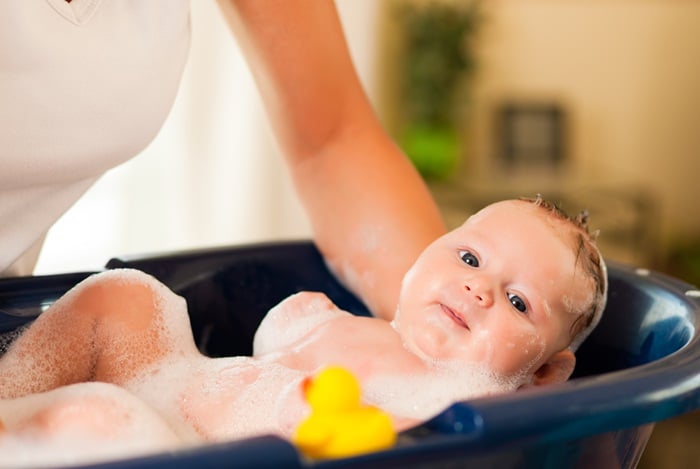
- Change your diaper after every bowel movement and every two to three hours, even if you don't have a bowel movement. You can choose special diapers for newborns with a wetness indicator;
- The rules of intimate hygiene mean that after defecation, the child is washed, and then powder is applied to the dried skin. As a powder, it is better to choose liquid talc. It absorbs moisture well and prevents diaper rash. Powdered powders, when interacting with liquid, turn into lumps, which irritates the skin and brings discomfort to the baby. Powders are suitable for oily skin, and for dry - choose a cream containing talc;
- After treating the skin with talcum powder, do not rush to put on a new diaper. Wait until the product dries, give the baby an air bath. Such baths harden the child and increase immunity, improve skin condition and help avoid diaper rash;
- Wash your baby with your hands, not with a sponge or washcloth. At the same time, do not forget about your hygiene! Mom's hands should be clean and well-groomed without long nails. Wash your hands regularly with soap and water before washing or feeding your baby;
- The child should have personal hygiene products, which include cosmetics (creams, shampoos, etc.), towels, wet and dry wipes, nail clippers and a hair brush. Choose only hypoallergenic products on a natural basis;
- To maintain intimate hygiene, choose underwear and clothes for newborns only from natural, environmentally friendly and hypoallergenic materials. Cotton and flannel are good for babies. For more information on how to dress newborns, read;
- Try to use a minimum of cosmetics. You can also wash your baby with plain water without soap. This will preserve the normal microflora and health of the genital organs of the child.
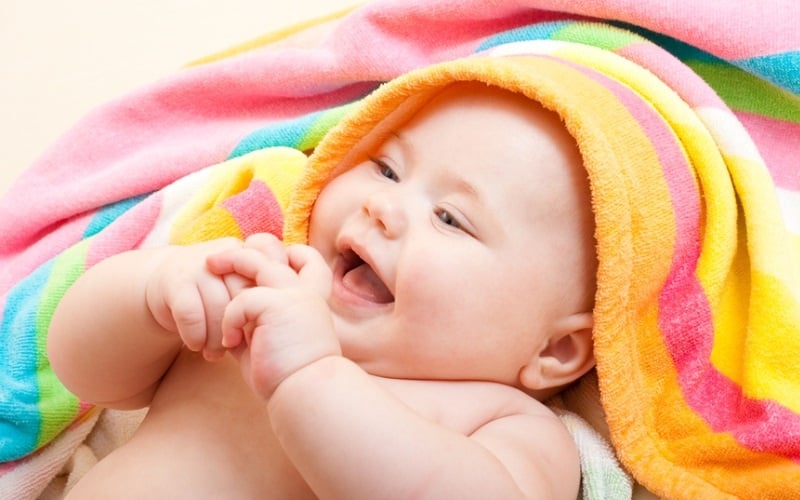
Intimate hygiene for girls
Caring for the genitals of a newborn girl has its own characteristics. First of all, it is important to follow the sequence of washing. First, the genital gap, labia, groin folds, and lastly, the anus are wetted with a clean, dry and soft towel.
In the first weeks, a newborn girl may experience spotting. There is nothing to worry about if the genitals are not reddened, and purulent discharge with a pungent odor is not formed. Otherwise, contact your doctor immediately! Ordinary spotting is harmless and goes away within a few days after birth.
Genital care is important after every bowel movement and diaper change. To properly wash the girl under the tap, support the tummy with one hand and rinse with the other. Rinse your baby from front to back, i.e. towards the anus.
What not to do:
- Do not rub the inside of the labia, as this can cause infection;
- You can not wash girls in the pelvis, as particles of feces can get into the vagina, which will lead to inflammation;
- You can not wash girls in the direction from the anus;
- Do not overdo it! Too frequent washing injures the delicate mucous membrane of the genital organs of the baby.
Nipples in girls also require care. Hygiene features are that the nipples are wiped 3-4 times a day with a weak solution of furacilin. It disinfects the skin and reduces the swelling of the breasts, which are typical in the first days of a girl's life.
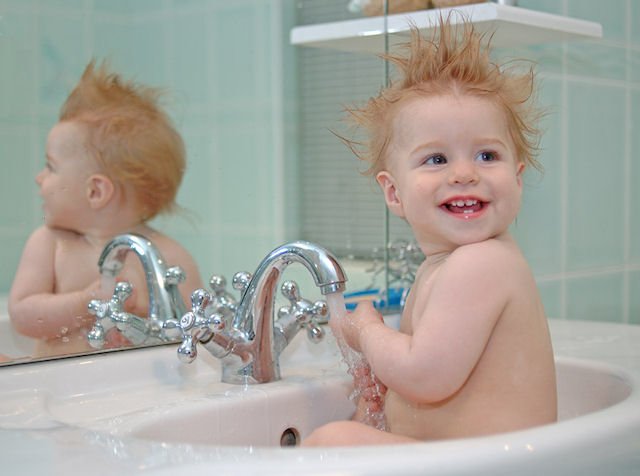
Intimate hygiene for boys
The rules for caring for the boy's genitals are a little simpler. First of all, every day after changing the diaper, the penis and scrotum are washed with running water without soap and other cosmetics. Inguinal folds are treated with powders or cream, depending on the fat content of the skin. Do not forget about regular diaper changes, daily bathing and air baths. These are all the features and rules of intimate hygiene for boys!
What not to do:
- Pull the foreskin and open the baby's head of the penis. At birth, these organs are fused, then the foreskin gradually shrinks itself;
- Wash the foreskin with soap! Soap strongly irritates delicate thin skin and causes redness;
- Climb with cotton swabs under the foreskin to clean the infant segment. Segma comes out on its own when urinating.
When providing care for the genitals of newborns, it is important to choose the right hygiene items. These should be high-quality, safe and natural products that do not cause allergies. As a rule, an allergic reaction occurs within two days after contact with an irritant. If you notice such a reaction, stop using the product immediately and contact your pediatrician.
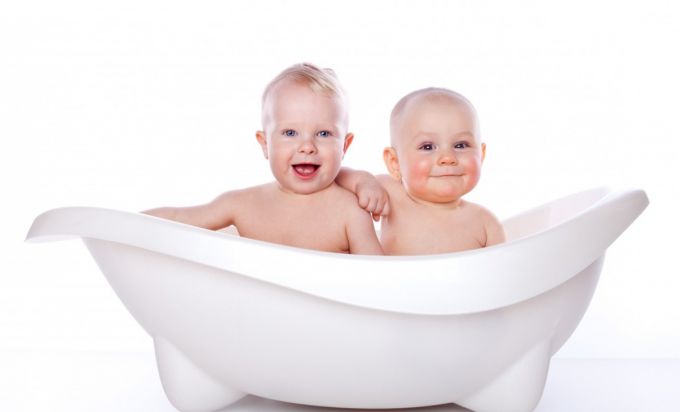
How to choose the right hygiene products
- Before buying cosmetics, carefully check the expiration date, the integrity of the package and the composition. Choose only certified products! It is good if each product has a separate certificate;
- Products must not contain harmful substances. Therefore, choose compositions without mineral oils, parabens, sulfates, dyes and other chemicals;
- Choose hypoallergenic formulations. Keep in mind that natural and organic products also cause allergies. It is important to choose cosmetics that suit your baby. Unfortunately, allergies can only be identified through trial and error;
- Intimate hygiene products for babies should be soft and gentle;
- Choose special products for newborns or for children under one year old, as they contain the right pH level. In this case, the standard children's bathing gel is not suitable, and, moreover, adult products. Such hygiene items aggressively affect the delicate skin of the baby. They can cause severe allergies and even lead to infection or inflammation of the genitals.
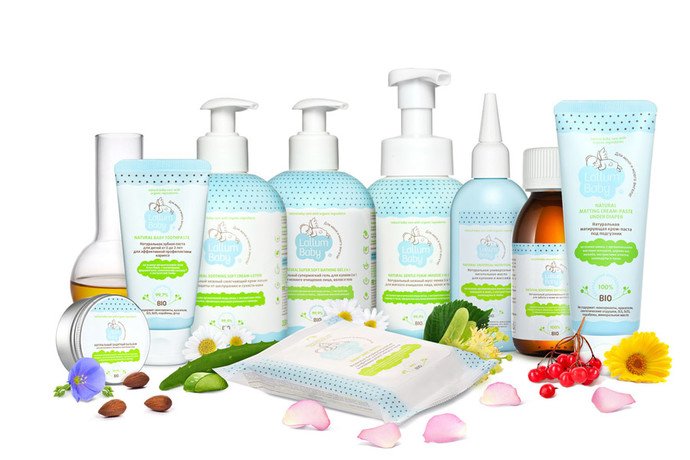
Popular hygiene products for newborns
| brand | Characteristic | Range | Price |
| Eared nanny (Russia) | Soothes irritations and soothes the skin, creates a protective layer and is easy to apply, however, many products contain sulfates and other harmful substances. | Bathing gel, washing powder, creams, oils and milks, toothpaste, shampoos, cream soaps | 100 rubles (diaper cream, 100 ml) |
| My sun (Russia) | Budget brand with high detergent properties, which can irritate the baby's skin, prevent diaper dermatitis | Washing gel, creams, oils and milks, shampoos, mosquito spray, liquid soap | 50 rubles (diaper cream, 50 ml) |
| Our mother (Russia) | Safe formulations at an affordable price, take into account the characteristics of the skin, produce products for normal, delicate and problem skin | Creams, bathing gels, oils, liquid and regular soaps, protective emulsions, milks and shampoos | 160 rubles (diaper cream, 100 ml) |
| JOHNSON'S Baby (France) | Natural natural composition with a mild effect, but often cause allergies | Oils and sprays, milks and creams, powders and sprays, shampoos | 115 rubles (diaper cream, 50 ml) |
| Bubchen (Germany) | Harmless composition, it is important to choose the “From the first days” series! Suitable for delicate and sensitive skin | Shampoos, creams, milks and oils, powders, baths and lotions, facial cleansers | 210 rubles (powder, 100 ml) |
| Sanosan (Germany) | Gentle care, suitable for sensitive skin, relieves irritation, can be used for skin lesions, dermatitis and other problems, but contains parabens | Creams and gels, bath foam, shampoos | 250 rubles (diaper rash cream, 150 ml) |
| Little Siberica (Russia) | The new series of the Siberica cosmetic line has collected positive reviews from mothers, it is distinguished by an exclusively natural composition | Talc, creams, shampoos, toothpaste, hair balm, milk, liquid soap, bathing foam, oils | 220 rubles (diaper cream, 75 ml) |
| Mustela (France) | A wide line of cosmetics with a safe and natural composition, provides gentle care, but is notable for its high cost. | Bath foam, wet and dry wipes, shampoos, bathing gels, creams and oils, milk | 500 rubles (diaper cream, 50 ml) |
